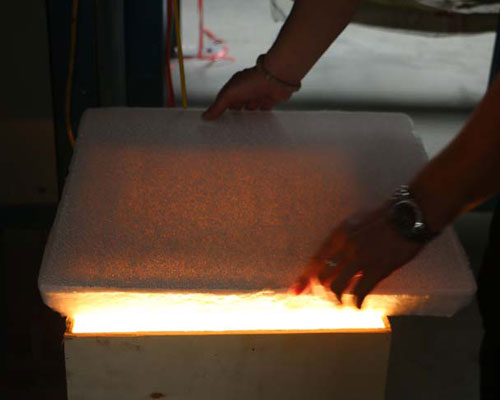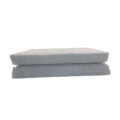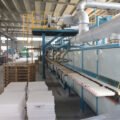The AdTech foam ceramic filters for aluminium are produced based on a carrier with a solid network structure and organic foam cells. The production steps are as follows.
The carrier is put into the thixotropic alumina slurry, and the square centering automatic extrusion process is adopted to make the slurry uniformly deposit on the foam skeleton of the carrier. After drying and solidification, the final product is calcined at a high temperature of 1180°C. The filter is installed in the filter cup to filter the impurities in the molten aluminum alloy, helping to meet the production requirements of high value-added, high-tech performance aluminum alloy precision casting, such as computer hard disks, printed PS substrates, canned materials, turbines Fan blades of jet engines, etc.
Advantages of Using Foam Ceramic Filters for Aluminium
- Improve extrusion efficiency: When using the filter plate to purify the 6063 alloy extruded billet, we tracked a specific die and found that the extrusion speed increased by about 20% and the productivity increased by nearly 15%.
- Extend mold life and reduce mold maintenance times.
- Reduce stress: When the 6063 alloy melt was purified using a filter plate, it was found that the extrusion force was lower than the unfiltered extrusion force by more than 3%.
- Greatly improve the surface quality of aluminum profiles. In terms of reducing production costs and improving product quality, the use of ceramic foam filter plates to purify aluminum melt has great advantages.
Ceramic Foam Filter Uses
- Clean the CFF filter box.
- Gently put the filter plate into the ceramic foam filter, and then press the gasket on the filter plate by hand to prevent the flow of aluminum liquid.
- Preheat the filter box and filter plate evenly to make it close to the temperature of aluminum. Preheat to remove moisture and facilitate initial transient filtration. Preheating can use electricity or gas for heating. Normally, it takes about 15-30 minutes.
- Pay attention to the replacement of the aluminum hydraulic head during casting. The normal starting pressure head is 100-150mm.
- When the molten aluminum starts to pass, the indenter will drop below 75-100mm, and then the indenter will slowly increase.
- In the normal filtration process, avoid knocking and vibrating the filter plate. At the same time, the washing tank should be filled with molten aluminum to avoid excessive interference with molten aluminum.
- After filtering, take out the filter plate in time to clean the filter box.



